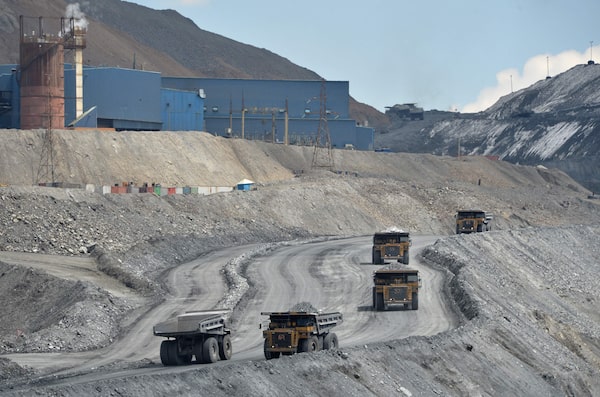
The Kumtor gold mine in Kyrgyzstan, on May 28, 2021.VYACHESLAV OSELEDKO/AFP/Getty Images
Centerra Gold Inc. CG-T is selling its giant Kumtor gold mine to Kyrgyzstan for just under a billion dollars, a fraction of what it was once worth, and almost a year after the former Soviet republic nationalized the asset.
Last May, Kyrgyzstan took control of Kumtor based on allegations that Toronto-based Centerra had committed both environmental infractions and tax fraud. Centerra denied the allegations and in turn accused a former director of conspiring to steal the mine. The Canadian gold miner subsequently launched an international arbitration suit against the Kyrgyzstani government in an attempt to be fairly compensated for its loss.
On Monday, Centerra said in a statement it intends to take back the 77.4 million shares that Kyrgyzstan owns in the company; the 26-per-cent equity stake is worth $972-million CAD. Centerra intends to immediately cancel the shares, reducing its share count accordingly. In turn, Kyrgyzstan will gain 100-per-cent ownership of the mine. Centerra also said it will pay the central Asian republic US$86-million to settle outstanding taxes, and other incidentals. Moreover, the Canadian miner agreed to drop all legal actions it previously brought against the government. The value that Centerra is salvaging for Kumtor is only about a sixth of what it was once worth.
Located 350 kilometres southeast of the Kyrgyzstani capital of Bishkek, Kumtor is one of largest gold mines in central Asia. Since the 1990s, Kumtor has produced more than 13 million ounces of gold, and is the single biggest contributor to GDP in Kyrgyzstan. Centerra’s ownership dates to 2004. John Tumazos, a mining analyst with Very Independent Research LLC, last year estimated the mine’s fair market value at US$5-billion.
While the pact gives investors much more certainty around Centerra, it leaves the company with a gigantic production hole. Kumtor previously accounted for more than half of Centerra’s gold production. Centerra’s remaining Mount Milligan mine in British Columbia and Oksut operation in Turkey are expected to produce about 425,000 ounces of gold combined in 2022, compared with the roughly 575,000 ounces of gold forecast at Kumtor.
Shares in Centerra have rebounded strongly in recent months, with the company indicating that it was nearing an agreement with Kyrgyzstan. On Monday, shares in Centerra fell by 0.6 per cent to close at $12.48 apiece on the Toronto Stock Exchange,
The settlement with Kyrgyzstan will require a shareholder vote at Centerra, with a threshold of at least two-thirds of votes cast needed for approval.
Michael Siperco, an analyst with RBC Dominion Securities, said in a note to clients that the agreement removes a major overhang from Centerra’s shares, and increases management’s ability to return cash to shareholders.
“We see potential for a special dividend or buyback,” Mr. Siperco wrote.
The resolution of the conflict also raises Centerra’s attractiveness as either a potential takeover candidate, or merger partner with another company.
“The streamlined Centerra is an attractive company for peers seeking to consolidate,” Trevor Turnbull, an analyst with Scotia Capital, wrote in a note.
In fact, last week, a trio of Scotia mining analysts, including Mr. Turnbull, speculated that a Centerra merger with fellow mid-tier gold miner Eldorado Gold Corp., which also has operations in Turkey and Canada, could be welcomed by investors, considering the geographic overlap and the potential to cut costs.
Scotia Capital also said that a Centerra merger with Australia’s OceanaGold Corp., which has mines in New Zealand, the Philippines and the United States, also potentially has merit. The combined company would gain a higher profile in the industry, sport a strong balance sheet, and likely command a higher stock market valuation, the analysts said.
The pending exit of Centerra from Kyrgyzstan mirrors the experience of another major Canadian gold miner, whose long history in a volatile Asian mining jurisdiction is coming to an end. Last week, Kinross Gold Corp. said it was in discussions with an unnamed mining company to sell both its Kupol mine and Udinsk development project in Siberia. Toronto-based Kinross was forced to cease operations in Russia, after the invasion of Ukraine made it politically untenable to continue to operate there. Owing to Russia’s pariah status on the international investment stage, analysts are not expecting Kinross to receive anywhere near the fair market value for its Russian business. Kinross has operated in Russia for more than 20 years.
Your time is valuable. Have the Top Business Headlines newsletter conveniently delivered to your inbox in the morning or evening. Sign up today.